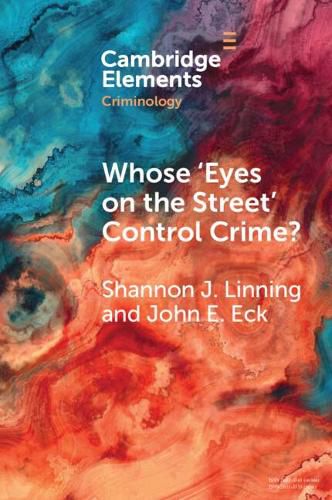Readings Newsletter
Become a Readings Member to make your shopping experience even easier.
Sign in or sign up for free!
You’re not far away from qualifying for FREE standard shipping within Australia
You’ve qualified for FREE standard shipping within Australia
The cart is loading…






Jane Jacobs coined the phrase ‘eyes on the street’ to depict those who maintain order in cities. Most criminologists assume these eyes belong to residents. In this Element we show that most of the eyes she described belonged to shopkeepers and property owners. They, along with governments, wield immense power through property ownership and regulation. From her work, we propose a Neo-Jacobian perspective to reframe how crime is connected to neighborhood function through deliberate decision-making at places. It advances three major turning points for criminology. This includes turns from: 1. residents to place managers as the primary source of informal social control; 2. ecological processes to outsiders’ deliberate actions that create crime opportunities; and 3. a top-down macro- to bottom-up micro-spatial explanation of crime patterns. This perspective demonstrates the need for criminology to integrate further into economics, political science, urban planning, and history to improve crime control policies.
$9.00 standard shipping within Australia
FREE standard shipping within Australia for orders over $100.00
Express & International shipping calculated at checkout
Jane Jacobs coined the phrase ‘eyes on the street’ to depict those who maintain order in cities. Most criminologists assume these eyes belong to residents. In this Element we show that most of the eyes she described belonged to shopkeepers and property owners. They, along with governments, wield immense power through property ownership and regulation. From her work, we propose a Neo-Jacobian perspective to reframe how crime is connected to neighborhood function through deliberate decision-making at places. It advances three major turning points for criminology. This includes turns from: 1. residents to place managers as the primary source of informal social control; 2. ecological processes to outsiders’ deliberate actions that create crime opportunities; and 3. a top-down macro- to bottom-up micro-spatial explanation of crime patterns. This perspective demonstrates the need for criminology to integrate further into economics, political science, urban planning, and history to improve crime control policies.